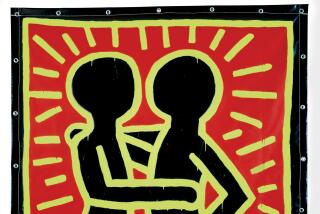JAZZ REVIEW : Shearing Plays Assured Set in JVC Fest at Carnegie Hall
NEW YORK — Just 44 years after his quintet’s recording of “September in the Rain,” George Shearing was the central figure in “Lullaby of Birdland,” named for his best known song and presented Friday at Carnegie Hall as part of the JVC Jazz Festival.
Time has been kind to the Shearing sound, once accused of blandness. Backed by a first rate bassist, Neil Swainson, he swings consistently and displays a rare level of harmonic subtlety.
Shearing geared his set carefully to the tastes of the near-capacity crowd; he even played “Lullaby of Birdland” without comedy gimmicks. Opening with an early Bird blues, “Cheryl,” he segued to “Don’t Explain,” Clifford Brown’s “Joy Spring” and Bud Powell’s “Wail.” He then joined with the Count Basie Band for “The Kid From Red Bank,” played with as much assurance as if he were a regular member of the orchestra.
The Basie ensemble, cohesive as ever and led by saxophonist Frank Foster, stuck mostly to such old chestnuts as “Shiny Stockings,” Neal Hefti’s “Whirly Bird” and Ernie Wilkins’ “Basie.”
In the pre-Shearing half of the concert, two ad-hoc sextets played tunes evoking memories of Birdland, the club on Broadway near 52nd Street that flourished from 1949 to 1964. Several participants--Jon Faddis, Red Rodney, John Lewis et al--had been heard at one or more concerts earlier in the week. Dr. Billy Taylor, who for two years was house pianist at Birdland, served as the genially informative host but never got close to a piano.
Thursday at Avery Fisher Hall “The Jazz Connection: The Jewish and African-American Relationship” offered a provocative premise that seemed unsure of its direction. For most of the first half it was apparently based on the assumption that all jazz is in a minor key and thus is related to the wails heard in synagogues. This theme was carried out by a splendid cantor, Joseph Malovany; by Carrie Smith singing “Motherless Child,” then by a rare tape of Louis Armstrong singing “Russian Lullaby” and a live band led by trumpeter Randy Sandke repeating the tune. Later the Klezmatics, whose Yiddish dance music is marginally related to jazz, played and sang three numbers, complete with fiddle and accordion.
The fact is that most jazz, even the blues, is in a major key. This point was finally acknowledged with “Apex Blues,” for which a studio clarinetist, Walt Levinsky, offered a fair imitation of Benny Goodman and Michael White played a less-than-fair impression of Jimmy Noone, who purportedly influenced Goodman.
Joshua Nelson, an Orthodox Sephardic black Jew seated at the piano and wearing a yarmulke, sang “Didn’t It Rain,” sounding like a male Mahalia Jackson. Regrettably, this was his only song.
George Gershwin was recognized with “Embraceable You,” played in the styles of Roy Eldridge and Charlie Parker, followed by “Porgy” and “Summertime,” sung with warmth and passion by Carrie Smith. But there were no salutes to Harold Arlen, Irving Berlin and other great writers who contributed to the jazz repertoire; nor was any time devoted to Artie Shaw, Stan Getz, Al Cohn and dozens of other Jewish virtuosos. Instead, Randy Sandke’s group played his “Genesis,” an interesting but uneven mixture of original sounds and quotes from jazz sources.
Cab Calloway, billed as a star, was hospitalized with a broken hip and not replaced, except for a brief quasi-Hebraic excerpt from his record of “Utt Da Zay.” The evening closed with guitarist Mark Whitfield, the half-Jewish saxophonist Joshua Redman and fluegelhornist Clark Terry, performing Gershwin’s “I Got Rhythm.”
As the festival drew to a close Saturday, the impression was that a healthy proportion of estimable recitals had been heard, of which few were able to attract a full house. The conventional wisdom is that the economy is more to blame than producer George Wein. He has already had to compromise by offering fusion and other borderline events; to make any further concessions could be fatal to the music for which he has served invaluably as a creative force in the last 40 years.
More to Read
The biggest entertainment stories
Get our big stories about Hollywood, film, television, music, arts, culture and more right in your inbox as soon as they publish.
You may occasionally receive promotional content from the Los Angeles Times.










